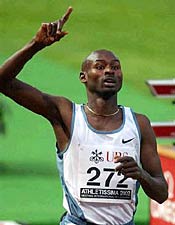Kenyan 1,500 metres runner Bernard Lagat wants the current test for the banned endurance booster EPO scrapped after a report by his scientific representative has concluded the test has many pitfalls.
Cleared of doping in October, Lagat called on the governing body of world athletics (IAAF) and the World Anti-Doping Agency (WADA) to stop the test until it has been improved.
 "The report confirms and reinforces what I have always maintained, I have never taken any illegal nor legal performance-enhancing drug," Lagat said in a statement released on Wednesday.
"The report confirms and reinforces what I have always maintained, I have never taken any illegal nor legal performance-enhancing drug," Lagat said in a statement released on Wednesday.
"But it goes much further and shows that the present testing for EPO is fundamentally flawed."
The 2000 Olympic bronze and 2001 World championship silver medallist was temporarily suspended in early September after his 'A' sample tested positive for EPO (erythropoietin). He was reinstated five weeks later after tests on his B sample proved negative.
Lagat said the report -- compiled by Dr Hans Heid, who represented Lagat at the laboratory testing of his 'B' sample in late September -- said "the test used involves many steps with many pitfalls". He called for it to be shortened and simplified.
ANTI-DOPING EXPERTS
Heid's report also found that shortfalls in the transportation and handling of the samples could have led to the positive result of Lagat's 'A' sample, the athlete's manager James Templeton said in a statement.
IAAF spokesman Nick Davies said that the sport's ruling body had not yet seen the report but would pass it to their own medical and anti-doping experts. The IAAF considered the EPO test reliable, he added.
"The recent Court of Arbitration for Sport (CAS) decision relating to the athlete Brahim Boulami of Morocco categorically stated that the EPO test was totally reliable," he said.
Boulami, the steeplechase world record holder, showed traces of EPO in his body in August 2002. The Moroccan Athletics Federation decided in February not to sanction him because of doubts over the testing methods.
However, the IAAF filed an appeal with CAS asking that the athlete receive a two-year ban in accordance with the world governing body's anti-doping rules. CAS ruled Boulami should be banned.
"I have always been in favour of eliminating drug taking from athletics and strongly endorse drug testing but it must be fair and reliable and seen to be fair and reliable," Lagat said.
"I wouldn't want any fellow athlete to suffer the way I did during those five weeks. The experience was the reverse of natural justice. I appeared to be guilty until I was proven innocent."








 © 2025
© 2025